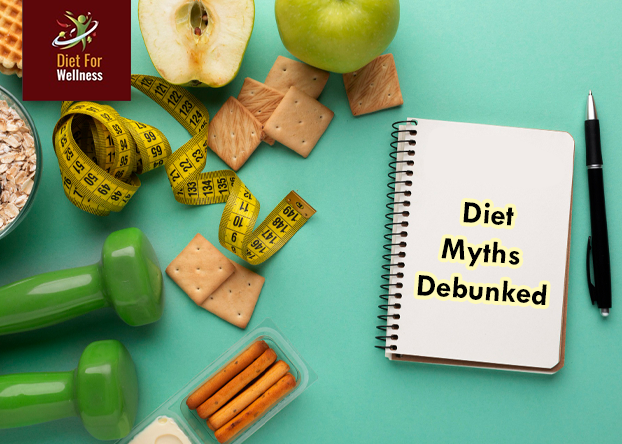Diet Myths Debunked

While you scroll through your social media feeds, flip through the pages of the magazines, or visit popular websites, you’re bombarded with nutrition and health advice. However, much of this information lacks credibility.
The issue extends beyond everyday sources. Even qualified healthcare professionals, like doctors and dietitians, can sometimes contribute to the confusion by sharing inaccurate information.
Diet myths are everywhere and these misconceptions can lead to unhealthy habits and hinder your journey to better health.
So we have come up with this blog to debunk some common diet myths.
Myth 1- Carbs Are the Enemy
Fact- Carbohydrates have earned a bad reputation, but they are an essential part of a balanced diet. Carbs provide energy, fuel our brain, and support bodily functions. It is important to choose the right kinds of carbs. Opt for whole grains, fruits, vegetables, and legumes rather than refined carbs like white bread and sugary snacks.
Myth 2- All Fat Is Bad
Fact- Not all fats are created equal. While trans fats and excessive saturated fats can increase the risk of heart disease, healthy fats are vital for our body. Include nuts, seeds, avocados, and olive oil as healthy fat options. These fats help absorb vitamins, protect our organs, and provide long-lasting energy.
Myth 3- Skipping Meals Helps You Lose Weight
Fact- Skipping meals can backfire by slowing down your metabolism and causing overeating later. It’s important to eat regular, balanced meals to maintain energy levels and prevent excessive hunger. Instead of skipping meals, focus on portion control and nutrient-dense foods.
Myth 4- Detox Diets Are Necessary for Cleansing
Fact- Your body has a natural detoxification process done through the liver, kidneys, and digestive system. Detox diets and cleanses often lack essential nutrients and can be harmful if done frequently. Supporting your body’s natural detoxification process by staying hydrated, eating a balanced diet, and exercising regularly is more effective.
Myth 5- Eating After 8 PM Results In Weight Gain
Fact- Weight gain is more about what and how much you eat, not when you eat. The total calorie intake and quality of food matters in this case. Late-night snacking on unhealthy foods can contribute to weight gain, but a balanced meal in the evening won’t automatically lead to extra pounds.
Myth 6- Supplements Are Required for a Healthy Diet
Fact- While supplements can be beneficial in certain situations, most people can get the nutrients they need from a well-rounded diet. Relying on whole foods ensures you get a variety of vitamins, minerals, and other beneficial compounds. Supplements should only be used to fill gaps in your diet, not replace healthy eating habits.
Myth 7- You Have to Stop Eating Your Favorite Foods
Fact- Depriving yourself of your favorite foods can lead to cravings and binge eating. Moderation is key. You can have your favorite treats occasionally, but make sure to make it a part of a balanced diet. The focus should be on portion control and making healthier choices most of the time.
Myth 8- High-Protein Diets Are Best for Weight Loss
Fact- While protein is important for muscle repair and satiety, a balanced diet that includes carbs and fats is essential for overall health. High-protein diets can strain the kidneys and may not provide enough fiber. Aim for a balanced intake of all macronutrients to support long-term weight management and health.
Now that you have understood the facts behind these diet myths, you will be able to make informed decisions about your nutrition and focus on long-term, sustainable habits rather than quick fixes.
And as the approach to nutrition may vary from person to person, you should listen to your body and consult with a healthcare professional for personalized advice.
